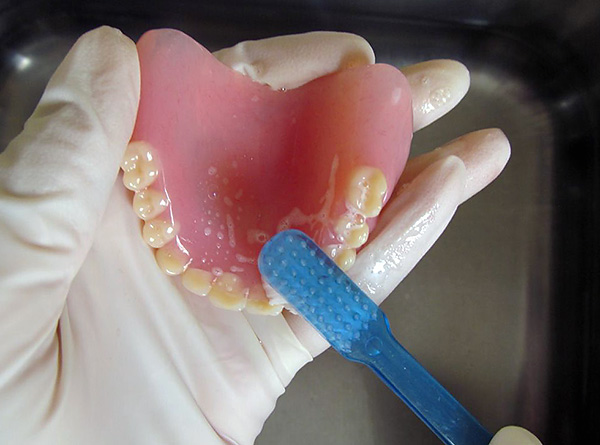
Next you will learn:
- Do removable dentures really require any special care, and if so, what should it consist of;
- What dentistry care products exist today (hygiene with the help of toothpastes and gels, effervescent tablets, ultrasound);
- What can I do if I cannot whiten the prosthesis at home - will I really have to change it?
- What folk remedies for cleansing a removable denture can not be categorically used (recommendations are given that will protect against meaningless experiments);
- What can lead to a lack of care for a denture and how to store it properly so as to maximize the life and not spoil ahead of time ...
When it comes to using a removable denture, it is important to understand that not only its life, but the condition of the oral cavity as a whole can depend on the care taken of this structure. At the same time, there is an opinion that supposedly the teeth are artificial, and the prosthesis itself is plastic - nothing will happen to him, because he cannot “rot” like his native teeth, and bacteria are unlikely to destroy it.
Well, it should be noted that with a full removable prosthetics (that is, with completely toothless jaws), the patient, due to such neglect of hygiene, risks losing at least money for the prosthesis, and as a maximum - gets putrid odor from the mouth and hard to heal ulcers on mucous membranes. And the owners of partial removable prostheses in the absence of proper maintenance of the structure in addition can quickly lose supporting teeth for which the prosthesis is attached to the mouth (for example, due to the development of periodontitis).
Why it happens?
The fact is that neglect of caring for a removable prosthesis will lead to the fact that microbial plaque will begin to accumulate in various areas of the structure (especially under the base, in the places of its transition to the rows of artificial teeth, the areas of attachment of clasps, etc.). Yes, artificial materials themselves will not “rot” in this case, but they will be an excellent carrier for colonies of microorganisms.
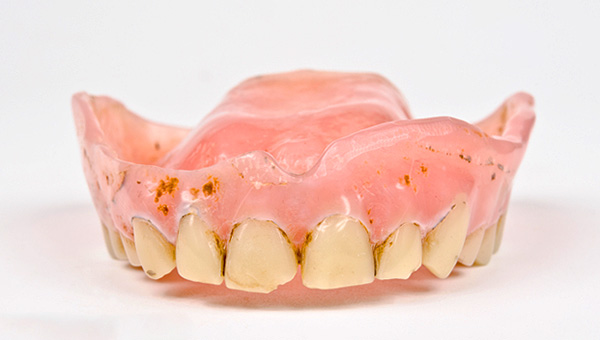
On a note
Initially, bacterial plaque on the denture is soft, loose in structure, and relatively easy to remove with a conventional toothbrush. However, in the absence of regular hygienic procedures, such plaque is subsequently gradually mineralized, pigmented and compacted, and often tartar is formed that injures the gums. On the denture, colored areas eventually appear, spots that significantly reduce aesthetics.
All this together not only creates bad breath, but also threatens the remaining teeth with the appearance of mobility (loosening), up to the need to remove them.
Bacterial plaque can form on any plastic prosthesis, be it an acrylic prosthesis, nylon, silicone or polyurethane.
Next, we will see how to properly care for a denture and how to store it in between wear, so that the design does not lose its functional and aesthetic characteristics and does not harm the mucous membranes of the oral cavity.
General principles for the care of partial and complete removable dentures made of various materials
Regardless of the type of denture (acrylic plate, soft nylon, clasp or even a compact butterfly prosthesis), the design itself always has areas that accumulate bacterial plaque.
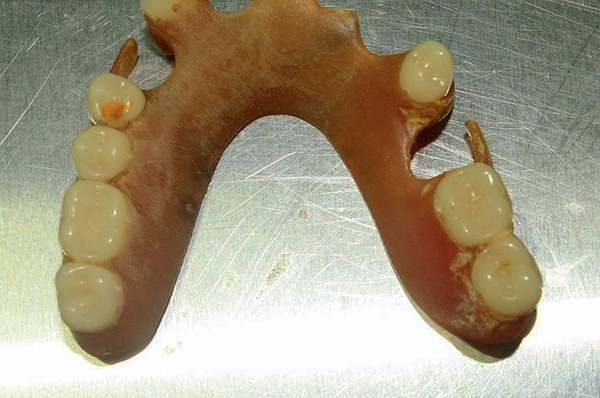
Therefore, the care of the prosthesis implies the following principles:
- Obligatory.Even if it seems to you that all surfaces of the structure are perfectly clean, it is still necessary to carry out their hygienic cleaning (at the initial stage, the bacterial plaque is only a few microns thick and visually invisible);
- Regularity. You need to take care of the prosthesis every day and not once - almost as carefully and regularly as you take care of your own teeth;
- An integrated approach to hygiene. A combination of different methods of cleaning the prosthesis is necessary - from simple rinsing with water to periodic use of special tools (more about them will be discussed below).
Here's a helpful reminder to help keep the denture clean:
- After each meal, rinse the prosthesis with water to remove food debris. If you do not use a cream to fix the denture, then the structure should be removed and simply rinsed in running water until all visible particles of food are washed. If a cream is used, then the design does not have to be removed - just rinse your mouth with water;

- In addition, daily prosthesis hygiene should be carried out using a soft toothbrush with a non-abrasive paste (any children's toothpaste that can be used from 0 years old is suitable - they have a minimum abrasion rate).
Important
It is strictly forbidden to use ordinary toothpaste and, especially, whitening to clean a removable denture. The average abrasiveness of ordinary toothpastes is at the level of 70 (RDA 70 can be written on the package), and for whitening ones it can reach up to 200. Under the action of the abrasive, microcracks form on the plastic and the smooth surface of the denture becomes rough over time - to such a surface dirt sticks more actively.
In children's toothpastes, the RDA is usually in the range of 0 to 20.
- With a frequency of about 1-2 times a week, the treatment of the prosthesis with special means is recommended - as a rule, they are sold in the form of effervescent tablets and contain components (proteolytic enzymes, antiseptics) that dissolve plaque and kill bacteria that live on the prosthesis. An alternative to using effervescent tablets for cleaning dentures is the use of an ultrasonic bath - with its help it is possible to almost perfectly clean the prosthesis (plaque, odor is removed, bacteria are destroyed);
- Approximately 1 time in 6-12 months a professional denture cleaning by a dentist is recommended;
- Most types of prostheses should be stored in a humid environment, as otherwise the product may become deformed when dried. For storage, you can use ordinary water, or special solutions for storing dentures that are sold in pharmacies (this is the preferred option). When the prosthesis is soaked, make sure that it is completely covered with the solution (or water). Do not place the structure in hot water, as this can lead to its deformation;
- In the case of using a partial denture, one should not forget about the thorough hygiene of the teeth remaining in the mouth.
Special hygiene products: pastes, gels, effervescent tablets and ultrasonic baths
The classic and at the same time very effective option for the mechanical cleaning of removable dentures is the use of a toothbrush and toothpaste.
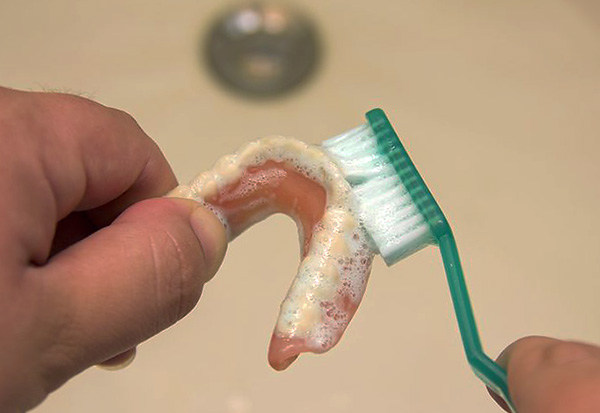
Toothpastes for caring for the prosthesis and their remaining teeth in the mouth should in most cases be different. Usually, children’s toothpaste is used to care for the removable structure, and ordinary adult toothpaste is used to care for their teeth and gums. In both cases, it is not recommended to use only children's paste in both cases, as its properties may not be sufficient for proper oral hygiene of an adult.
On a note
Instead of children's toothpaste, you can use specialized means in the form of gels for daily cleaning of dentures - for example, Dentipur Gel, CURAPROX BDC, etc.
The situation is similar with toothbrushes - for the remaining teeth in the mouth, the brush that is selected according to the individual condition of the teeth and gums of the person is suitable (most often it is a brush with bristles of medium hardness, but in the presence of gum disease, wedge-shaped defects or pathological abrasion brush with soft bristles). A soft toothbrush is always used to clean the removable structure (Soft or Sensitive can be written on the packaging).
A double-sided bristle brush is well suited for hygiene of internal and external surfaces.
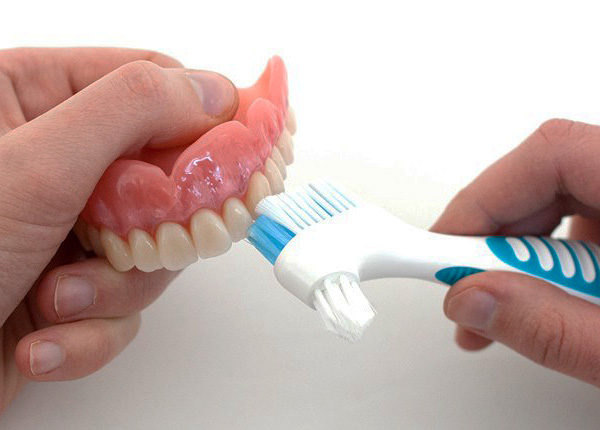
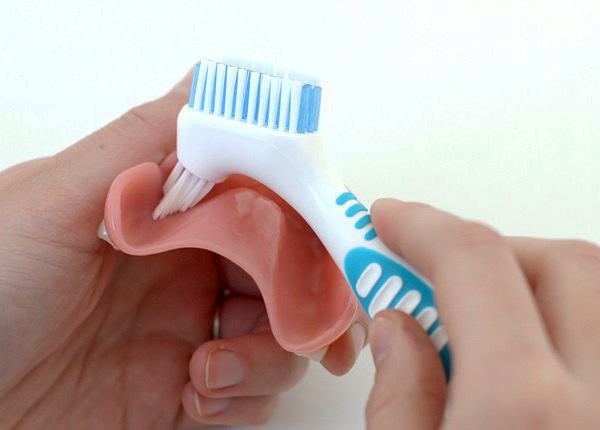
Feedback:
“I’ve been walking with a false jaw for about a month now. I had to remove 5 teeth, only two remained on top, so there wasn’t much choice. What can I say ... I thought it would be worse, and so normal. Just trying to come up with a bit of humor. After installing the jaw, I almost do not remove it, only to clean it. Nobody knows that I have a prosthesis on top, even a husband. ”
Elena, Moscow
However, for full-fledged care of the prosthesis, simple mechanical cleaning may not be enough, therefore, special tools designed for additional chemical exposure have been developed today. Such funds are mostly represented by effervescent tablets - they are placed in water to prepare a cleaning solution.
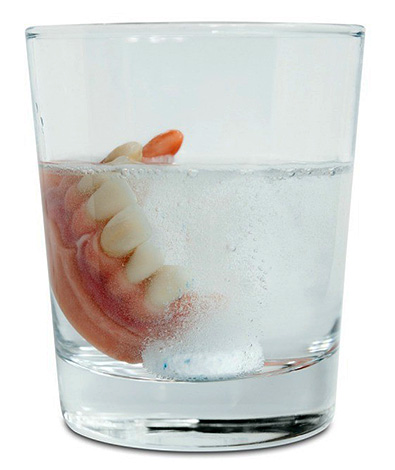
The principle of action of all tablets for the hygiene of removable structures is to dissolve plaque with the help of enzymes. In this case, the protein matrix of even partially mineralized plaque is destroyed, which in combination with mechanical cleaning gives a particularly pronounced effect (after standing in solution it is useful to brush the structure with a toothbrush).
On a note
At home, with the help of effervescent tablets for cleaning dentures, it is also possible to maintain a good appearance of the structure - it does not darken, pigmented spots do not form on its various surfaces. An important contribution is not only proteolytic enzymes that dissolve plaque, but also active oxidizing agents (usually potassium persulfate and sodium perborate), which discolor pigments due to their oxidation.
Examples of the most popular effervescent denture cleansing tablets today:
- Protefix;
- Corega
- ROCS;
- Lacalut Dent.
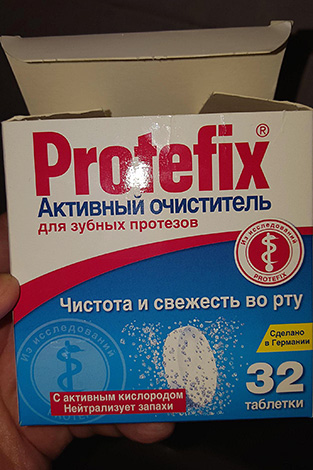
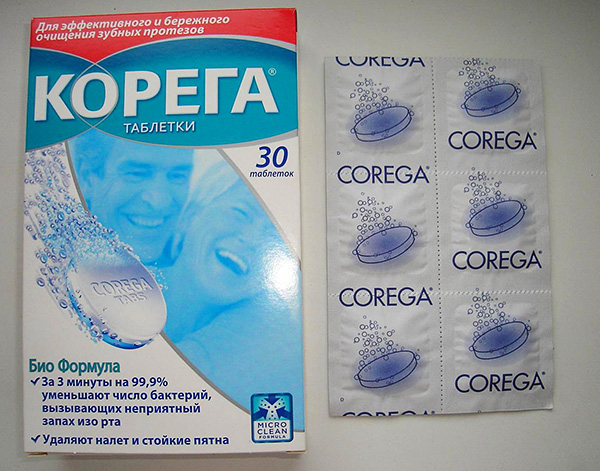
As an additional method of dental prosthesis hygiene, the use of ultrasonic baths can be noted. The principle of their action is to detach plaque from any surface (acrylic plastic, nylon, metal, silicone, polyurethane, polypropylene, etc.) due to the impact of mechanical ultrasonic vibrations transmitted in a liquid medium. Due to the action of ultrasound, not only a cleansing, but also an antibacterial effect is achieved.
The cost of high-quality ultrasonic baths is from 3000 rubles.
Professional Hygiene Techniques for Removable Dentures
If you properly clean removable dentures and provide them with proper care, then you can keep them in excellent condition for a long time. Despite this, at least once a year, it is recommended to assess the condition of the structure by a professional (orthopedic dentist), who can objectively assess how much the level of hygiene is appropriate.
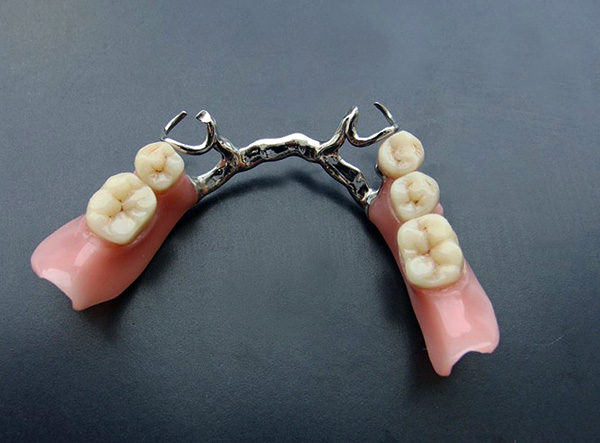
This is especially true for people who have bad habits that lead to fast, persistent staining of plaque (smoking, frequent consumption of coffee, wine). Whitening artificial teeth (and other surfaces of the structure) that have turned yellow during the operation of the removable prosthesis can be difficult to whiten at home, and in this case it is better to carry out this process in the dentist's office (or in the dental laboratory).
It should be understood that darkened removable dentures not only look ugly, but can also provoke inflammatory processes in the oral cavity - for example, from the side of the mucous membrane on which the structure rests. The result of this can be pain, burning, swelling, ulcers.
To prevent an adverse outcome, you should contact your dentist in a timely manner to remove plaque and stone from all surfaces of the prosthesis. Usually in the dental laboratory grinding and polishing of the structure is carried out, as well as cleaning using ultrasonic instruments.
Folk remedies for dentures: which options can not be categorically used
What kind of folk remedies for cleaning dentures do not try to use at home: from vinegar and lemon juice to hydrogen peroxide and alcohol-containing liquids.
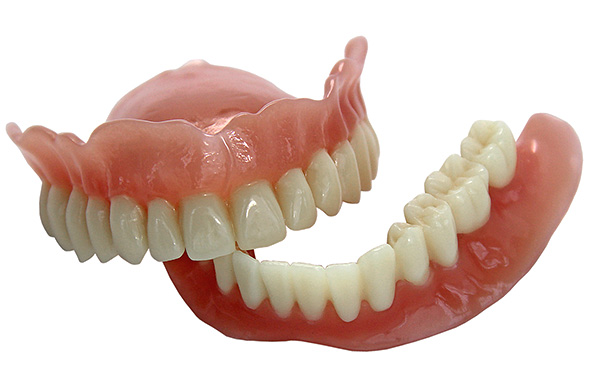
It is interesting
An example of one of the most ridiculous tips on caring for a denture is the recommendation to "soak" it in kefir.
However, not all popular recipes are harmless - often there is a risk of irreparably ruining the design.
In order to preserve from meaningless experiments in advance, the following are those that may pose the greatest danger to the condition of the prosthesis:
- On the Internet you can find many examples and reviews that mention the use of tooth powder to clean a removable denture - they say it cleans better than toothpaste. So, it cleans, maybe better, but due to its abrasive properties it scratches plastic surfaces, making them convenient for attaching plaque and developing colonies of microorganisms here;
- Another variation on the topic of making a composition that would clean better than toothpaste is a combination of soda and lemon juice (a couple drops of lemon juice are taken on a pinch of soda). Yes, sodium citrate formed during the chemical reaction, being a strong complexing agent, will contribute to the destruction of the mineral matrix of hard plaque, but the soda present in excess will perfectly scratch the prosthesis, worsening its characteristics. Therefore, this option of cleaning from plaque is unacceptable;
- Due to inexperience, some try to disinfect a removable denture using a strong solution of potassium permanganate (potassium permanganate). This usually leads to a persistent staining of materials of construction in a tan color (the smallest particles of insoluble in hydrated manganese dioxide are embedded in porous plastic);

- An attempt to disinfect the prosthesis in hot water leads to deformation of the structure;
- The use of White (an aqueous solution of sodium hypochlorite) can be dangerous for metal structural elements (for example, for clasps or the basis of a clasp prosthesis).
And etc.
Do not use metal objects to remove food debris from parts of the prosthesis - this can lead to scratches and chips.
In general, many popular methods of cleaning dentures not only do not cope with their task, but simply dissolve, corrode, paint or deform the structure, rendering it unusable.
What threatens the lack of dental care
Not only the thoughtless application of folk methods can create problems for owners of removable dentures. Numerous troubles complicating life can also provoke non-compliance or a complete rejection of hygiene.
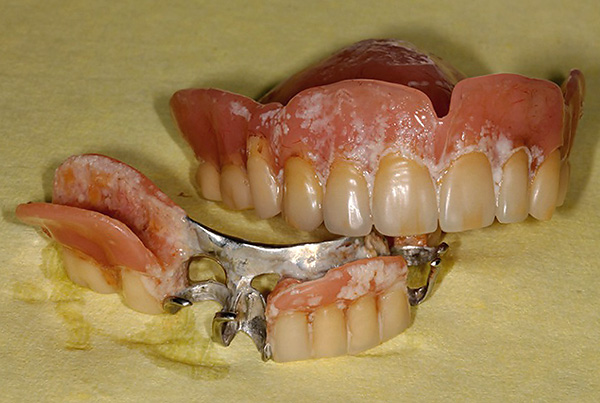
With insufficient hygiene, the following problems most often arise:
- Inflammation of the type of gingivitis, periodontitis, stomatitis (there is even such a thing as prosthetic stomatitis);
- Ulcerous formations in the zone of constant load or trauma against the background of dental deposits;
- Putrid breath;
- The development of caries and its complications on teeth preserved in the oral cavity in connection with the accumulation of plaque on them;
- Loosening of supporting teeth against periodontitis;
- Violation of taste (unpleasant aftertaste in the oral cavity);
- The appearance of age spots on the prosthesis in connection with the staining of bacterial plaque with dyes from food;
And etc.
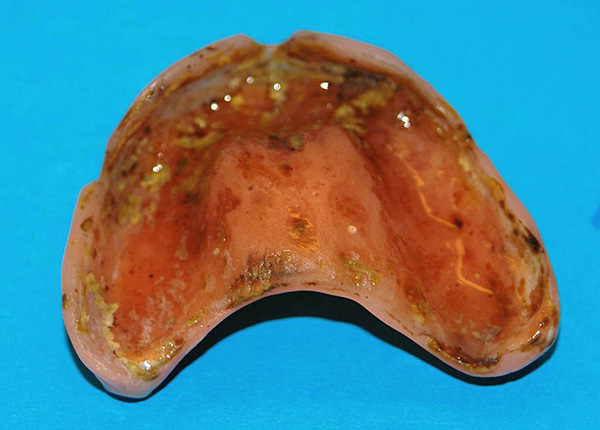
As you understand, this is not only about the aesthetic side of the issue, which, of course, is important for any holder of a removable denture. If hygiene rules are not followed, then pathological processes can even lead to the appearance of a malignant tumor in the area of chronic mucosal injury.
After the prosthesis is delivered, the orthopedic dentist presents a memo for caring for the product or simply gives valuable instructions - they should not be neglected.
How to store a removable denture in order to extend its service life and not to spoil ahead of time
Most removable dentures made today should be stored in a humid environment - drying out of plastic elements can lead to their deformation, which is not always restored when the product is re-wetted.
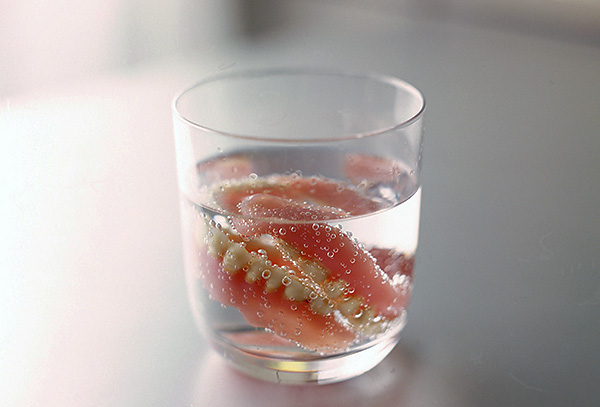
After removal (for example, at night) the prosthesis is lowered into a special antiseptic solution for prostheses (can be bought at any pharmacy), or simply into water. It is important to ensure that all parts of the structure are completely immersed in the liquid.
On a note
Most experts do not recommend removing the prosthesis just made at night due to the fact that getting used to it in this case is much faster. To do this, for about 2 weeks you will have to walk with a removable structure in your mouth almost all the time, only removing it briefly. However, in the future, a removable prosthesis still needs to be removed regularly so that the mucous membranes in contact with it rest (at least 6 hours a day).
If you have experience using a removable denture, share it by leaving a review at the bottom of this page.
Useful video: how to care for dentures and fully live with them
Specialist comments on important nuances of removable prosthetics

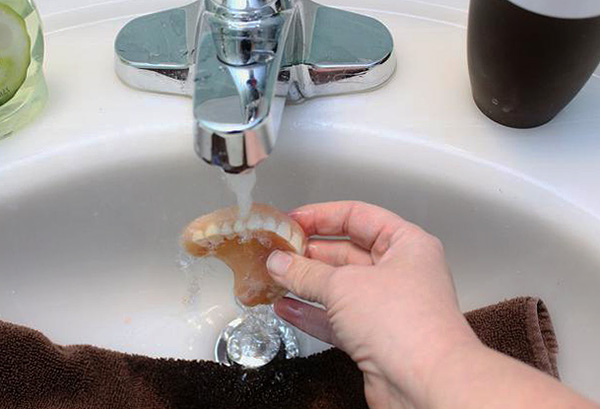
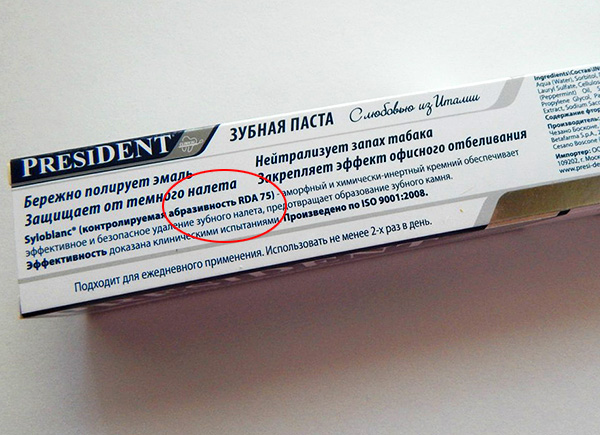
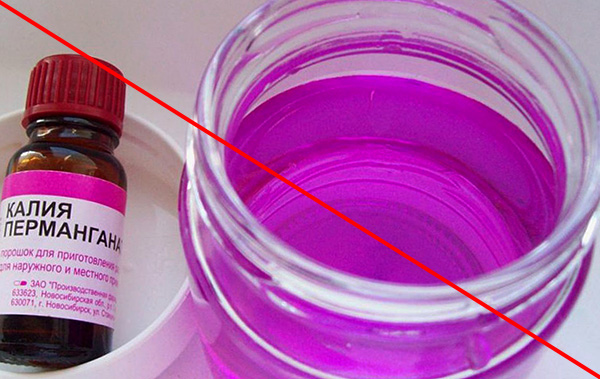
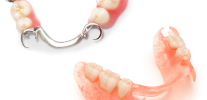
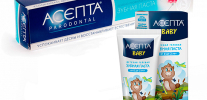
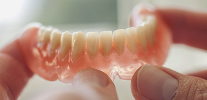
Full upper silicone prosthesis - it can only be worn with a core, otherwise it flies. But the doctor says that everything is fine. What to do?
Hello. Patients really often encounter poor fixation of a complete removable denture - this is primarily due to the fact that the usual complete removable denture rests on the soft gum and rests on it only due to the vacuum, sticking to the soft tissues. When chewing and talking, the mobility of the prosthesis occurs, and it may lose its vacuum fixation. To improve the fixation of prostheses, it is necessary to relocate once a year, but this problem cannot be fully avoided. In such cases, if the patient is not ready to put up with this, in the absence of teeth, dental implants are installed as supports. The implantation method is determined by the implantologist based on the results of X-ray diagnostics. Usually this is the only way to completely get rid of discomfort.
Can I clean a removable denture with soap?
Hello, Vladimir! To clean a removable denture, you can use both soap and toothpaste.I recommend that you clean the prosthesis once a day (in the evening) with a soft toothbrush. And during the day, after eating, rinse the oral cavity and the prosthesis itself.
To clean the prosthesis, it is not recommended to use a hard toothbrush and whitening toothpastes, as they are highly abrasive, and the prosthesis becomes “rough”, which leads to the accumulation of microorganisms and food particles on it.
I’ve been wearing a removable prosthesis for 3 years already. I’m cleaning it, using Korega tablets for processing, everything is as it should be. The question is this: I have a plaque and cracks in the tongue. Could this be due to a prosthesis?
Hello, Tatyana. The development of the problem indicated by you due to a removable denture is unlikely. Most likely, this is a consequence of a disease of the mucous membrane of the tongue (possibly a fungal infection). I recommend contacting a periodontist to clarify the true cause of the pathology.
Thanks.
I have been wearing dentures (upper and lower) for 5 years. She got used to the first two years - the doctor was not very polite, she didn’t go to her anymore. She managed it herself + the Internet helped. Now the problem is dry mouth, I can not take hot and sour food, jams. But also, I think, can handle it. Thanks to the Internet and to you!
So the other day I have to put on a complete removable denture. So it happened at age 52. Worried, cried. Tell us how you got used and what helped during this period?
Finally, I waited for my partial denture on the lower jaw (only 7 front teeth). The prosthesis is a complete disappointment. Speech defect, it hurts to chew, I want to push it out with my tongue. The doctor recommended to endure and not to remove. She took off only after eating, washed and dressed, but survived for less than a day, an ulcer formed on the gum. Now I heal an ulcer, wear a prosthesis only during meals to accustom the gums to it. Put the prosthesis in water with listerine. Am I doing the right thing?
Hello, Tatyana. Unfortunately, adaptation to a removable denture can really take a long time - often more than a month. Nevertheless, if the design immediately leads to the formation of ulcers on the gums and the appearance of severe pain, it is necessary to consult your doctor as soon as possible to correct the prosthesis. As a rule, this procedure takes no more than 15 minutes and immediately leads to significant relief. This is the best solution to the problem. But not to wear the prosthesis, to wear it only during meals is a less preferred option, since the time to get used to the prosthesis in this case can increase many times.
Thank you very much for your advice.
Hello. Please advise how to keep spray crowns longer?
Hello, Galina. Crowns are made with full regular chewing, so you do not need to limit the load on them. But what is really important is a visit to the dentist-hygienist 1 time in 6 months to conduct professional hygiene and early detection of problems. Unfortunately, many neglect this, and the doctor is faced with already running situations when conservative measures can no longer be dispensed with.
I liked the article, I first installed a removable upper denture on the hooks.
I use Korega to fix the upper jaw, in general I am satisfied: it fixes well and for a long time. The question is how to clean the oral cavity after I take out the prosthesis in the evening? Nothing has been written about this anywhere ...
Hello, Eugene.To clean the oral cavity from the fixing agent Korega, it is enough to rinse the mouth well with warm water. You can also use a toothbrush or a special brush with soft bristles. In any case, there should not be any problems with the removal of funds - therefore, probably, this is not particularly focused on.
I have a lower, partially removable denture with locks. I got used to it right away. The doctor, said that it should be removed only once a week for thorough brushing, and so brush your teeth daily after each meal. Three years after wearing the prosthesis, it became worse to clean and faster it feels plaque. Maybe you need to remove and clean it daily? At night, his doctor also did not recommend taking pictures.
Hello Svetlana. Removing the prosthesis and thoroughly cleaning it makes sense on a daily basis. You can also use special tablets for cleaning dentures. In addition, it is recommended to visit the dentist twice a year for professional cleaning of the oral cavity as a whole, since the plaque formed on the teeth, including artificial ones, is mineralized, and over time its removal at home becomes very difficult.